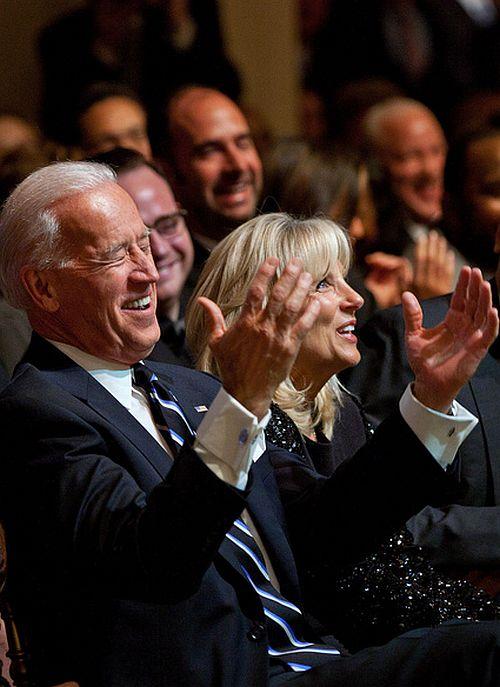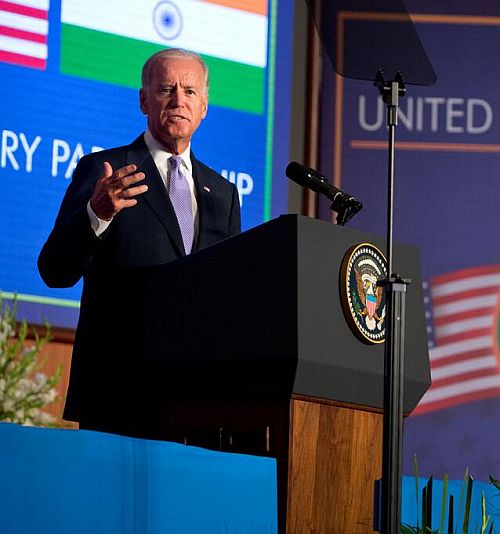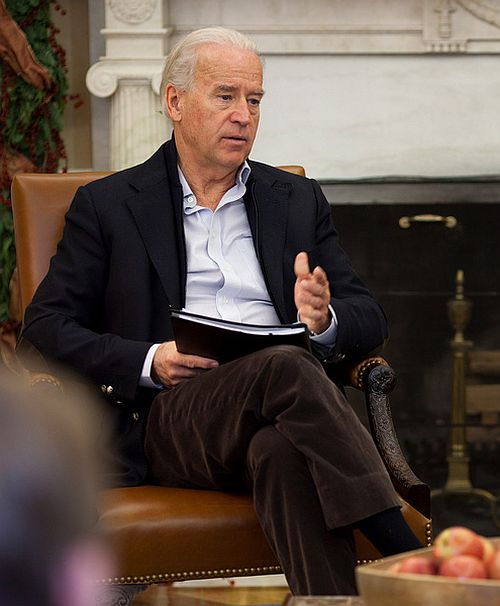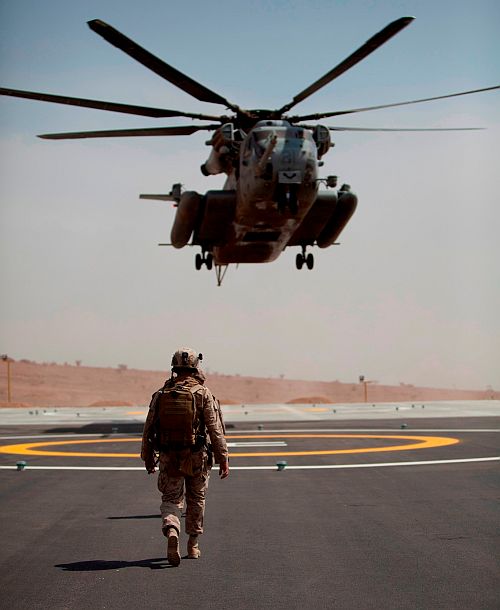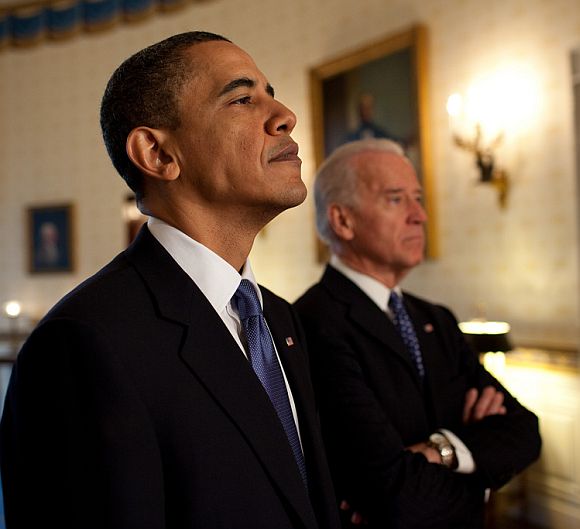 | « Back to article | Print this article |
Years later, Joe Biden talks beyond India jokes
There was a time when Joseph Biden used to crack one joke after another about Indians immigrants in the United States. Today, the US vice president realises how defining the Indo-US partnership is for the century ahead. Savera R Someshwar reports
Is American Vice President Joseph Robinette Biden planning to stand for election in India? Well he just might if he finds that missing Indian link in his family history.
When Biden was first elected to the US Senate -- at 29, he was one of the youngest ever do so -- one of the first letters he received was from someone called Biden in Mumbai.
The letter, according to Biden who was speaking to a select audience at Mumbai’s Bombay Stock Exchange, suggested that “our mutual, great, great, great, something or other worked for the East India Trading Company back in the 1700s and came to Mumbai.”
“To my regret,” said the vice-president, “I never followed it up.”
His little anecdote was greeted with laughter, but whether it will warm the cockles of the Indian -- and particularly the Indian-American -- heart is a different story altogether.
Biden has a history of making fun of Indian immigrants in America.
In 2006, for example, Biden had this pointed statement to make about that fact that many of the employees in convenience stores are Indians. ‘You,’ he said, ‘cannot go to a 7-eleven or a Dunkin’ Donuts unless you have a slight Indian accent. I’m not joking.’
Just six years later, as the American vice-president, he had another little joke to make about work that was outsourced to call centres, mainly in India.
‘How many times do you get that call,’ and he continued in what sounded like an Indian accent, “I’d like to talk to you about your credit card.”
In his speech at the BSE in Mumbai, however, there was no such gaffe.
Click on NEXT to read further...
Years later, Joe Biden talks beyond India jokes
Biden began by hitting all the right buttons, following his little anecdote with admiration for India’s democracy.
“We admire the way you have melded ethnicities, faiths and tongues into a single, proud nation; the way entrepreneurship seems almost hard-wired into Indian society, from rickshaw wallahs to web programmers; and, most of all, we admire the message your democracy sends to people everywhere in the world, that no nation needs choose between development and freedom,” he said.
He talked of how America has been strengthened by “the diverse cultures of India woven into the fabric of most of our communities.”
Standing within the precincts of the Bombay Stock Exchange -- which was one of the venue of the 1993 bomb blasts, the first of Mumbai’s many bloody trysts with terrorism -- Biden referred to the how both India and America have been scarred by this scourge.
“Our cooperation has grown dramatically in our shared fight against terrorism,” he said. “Together we are working hand-in-hand, sharing intelligence on terrorist groups so there will never be another 9/11; there will never another 26/11.”
In looking to battle terrorism, and to strengthen its economic ties, the United States has been restructuring strategic partnership in both Europe and Asia. And India, says Biden, is an important partner in this venture.
“The United States is elevating our engagement in the Asia-Pacific region. We refer to it as rebalance,” Biden said.
“Twenty, even 10 years ago, some might have suggested that India not be included in these discussions. Today, India is an indispensable part of our rebalance toward the Asia-Pacific.”
Click on NEXT to read further...
Years later, Joe Biden talks beyond India jokes
But the US rebalance towards the Asia-Pacific will also require America to ‘rebalance’ its relationship with Asia’s most powerful nation, China.
“I have heard people talk about the US-China relationship as everything from the next Cold War to the next G2. Neither of those characterisations is accurate,” said the US vice president.
Both the US and India have a “complex” relationship with China, said Biden.
“It has important elements of cooperation and also competition. We -- China, India and the United States -- are three big nations with our own perspectives. We have significant common interests. All three of us and the entire region would benefit if we coordinated more closely.”
Stressing on the importance of getting the relationship with China ‘right’, Biden suggested building a strong trilateral dialogue -- similar to the one India and the US have with Japan -- with the Asian Tiger.
Talking about India’s other neighbour, Pakistan -- which has, for the first time in its history as a nation, seen a democratically elected government complete its term in office and hand over power to another democratically elected government -- Biden stressed on the importance of an “early outreach” between Indian Prime Minister Dr Manmohan Singh and Pakistan’s newly elected Prime Minister Nawaz Sharif.
“It is not our place to lecture. It is not our place to dictate,” said the US vice-president.
“Our relationship (between India and America) will not be defined by India’s relationship to Pakistan. But America and the world have a deep stake in closer ties between India and Pakistan.”
He admitted that increasing the element of trust between the sibling nations was “an incredibly difficult nut to crack, but it’s yours to crack. But, as you know better than we do, progress would benefit everyone and make this region more secure.”
Click on NEXT to read further...
Years later, Joe Biden talks beyond India jokes
Biden lauded India’s “responsible leadership” role in helping stabilise Afghanistan, a country and a war that the US plans to exit by 2014.
“I know there are questions about the US position on reconciliation with the Taliban,” said the US vice president.
“I want to be clear: We have always been committed to an Afghan-led, Afghan-owned process that meets certain outcomes. The Taliban must break with Al Qaeda permanently; stop the violence; accept the Afghan constitution and guarantee free and equal treatment for women.”
Referring to India’s increasing food security concerns -- the Indian government has recently passed the Food Security Ordinance -- Biden said the US understood India’s problem.
“In December,” he said, “members of the World Trade Organisation will meet in Bali. We need to find a way forward to address India’s -- and I will be criticised for saying this -- India’s legitimate concerns about food security without distorting global trade.”
This, however, was tied to India playing by the global rules when it came to foreign direct investment, respecting medical patents viz-a-viz generic drugs and respecting intellectual property rights.
He also stressed on the importance of India joining in the battle to climate change by adopting clean energy and helping reduce the global carbon footprint.
“India has an essential role to play,” he said, “both to take its rightful place in international rule-setting and to accept the responsibilities that come with it. The two go hand in hand.”
Click on NEXT to read further...
Years later, Joe Biden talks beyond India jokes
Continuing with the carrot-and-stick game, Biden repeating his president’s words and referred to the Indo-US partnership a defining one for the century ahead.
“President Barack Obama is not engaging in hyperbole,” Biden said. “That’s why he stood in the Indian Parliament and declared to the world that ‘we look forward to a reformed United Nations Security Council that includes India as a permanent member’.”
Underlining the barriers to increased depth the relationship between India and the US, Biden said, “In your country as well as mine, there are still those who have lingering doubts of a Cold War era long gone by. It is time to put those doubts behind us and seize the opportunities ahead of us. Leaders, not bureaucracies, should set the level of our ambition. Let me state it plainly: There is no contradiction between strategic autonomy and a strategic partnership. Global powers are capable of both.”
Stressing on the importance of taking the India-US relationship forward, he said it would not benefit the world if, in future, India and the US were at “odds over the big issues.”
But the ties between the two nations would, he believed, be strengthened by its youth.
“Nothing gives me more hope that we can accomplish it together than our people; the 720,000 visas are issued here per year for the United States, the 100,000 talented Indian students studying at American Universities -- with the aim at doubling that number by 2020 -- and tripling the number of Americans studying in India.”
